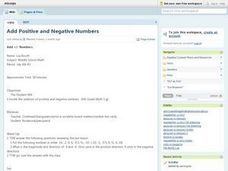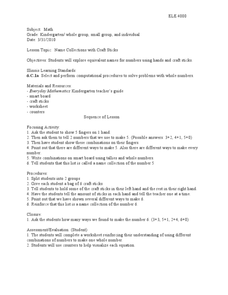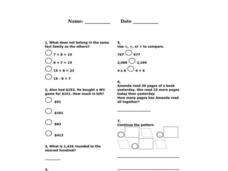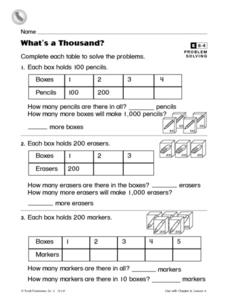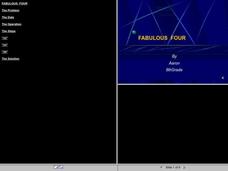Curated OER
Finding Place Values
As a review of identifying the value of numbers, this worksheet would be useful. In the thirteen question activity, learners take a three digit number, and identify the value in the hundreds, tens, and ones column.
Curated OER
Place Value Review
Review various aspects related to place value with this easy-to-follow presentation. Learners can review the base ten system, see representations, and read descriptions of ones, tens, hundreds, and thousands, and numbers in expanded...
Curated OER
Add Positive And Negative Numbers
Scholars investigate the concept of adding positive and negative numbers. They practice adding using the number line for scaffolding. This can be done as a game for younger learners, but may also be helpful for engaging the older pupils.
Curated OER
Name Collections with Craft Sticks
Groups of Kindergarten students count craft sticks in different groups and name how many they have. They complete simple addition to ten with the use of manipulatives.
Curated OER
Train Skip Counting: Count by 2s
Skip counting builds number sense and prepares learners for multiplication. Intended for use with Autistic children, but appropriate for anyone, this learning exercise provides a way to practice counting by 2s. There are 6 trains, the...
Curated OER
2 Elephants
In this number 2 worksheet, students look at the 2 different sized elephants, trace the number 2 three times and the word two twice and then print each one 5 times on their own.
Curated OER
Math Review
For this math review worksheet, students respond to 16 questions that serve as a review of fractions, decimals, patterns, number sense, properties, story problems, and computation.
Curated OER
Corn Field Math
Middle schoolers complete problems dealing with whole numbers, fractions and percents. After exploring the history of corn and related farming vocabulary, students work in pairs to solve multi-step problems. They incorporate the use of...
Curated OER
What's a Thousand?
Three tables are given for students to fill in with given information. After completing each table, students answer 2 questions about each table. These questions challenge students' number sense of 1000. Try instructing your students to...
Curated OER
Most and Least
Which one has the most? Each row has three sets of identical objects, and scholars compare the sets to determine which has the most or the least (they find the most for the first four and the least for the last four). One example is...
Curated OER
Fraction Introduction
Introduce fractions as a part/whole relationship. The slides in this resource show whole objects, half objects, and then relate the images to their numeric equivalent. This is a simple and basic introduction that uses a variety of...
Curated OER
Math: Navigating the World Around Me
Young mathematicians research and discuss real world math word problems and ways in which they apply math concepts in their everyday lives. They create a storyboard of a math word problem from which they create a slide for a multi-media...
Curated OER
Counting Mat
Using the provided counting mats (1-6 and 7-12) and small objects to count with, guide your young learners to match the correct number of objects to the written numeral and dots. Class members will either read the numeral and count out...
Inside Mathematics
Two Solutions
Many problems in life have more than one possible solution, and the same is true for advanced mathematics. Scholars solve seven problems that all have at least two solutions. Then three higher-level thinking questions challenge them to...
Have Fun Teaching
Base 10 Blocks
Base ten blocks are a great tool for teaching young mathematicians about a number of math concepts, unfortunately they aren't always available to teachers. That is, until now. This printable resource allows all...
Curated OER
Counting by 10s
You've got their attention once candy is the focus of a math activity! Learners count by 10 to determine how many candies are in each set, which are all grouped by 10. There is an example and number line to help them, and they write the...
Curated OER
Expanded Form
Explore place value through re-writing these two-digit numbers in expanded form. For example, 47 becomes 40 + 7. There is one example to model this, and scholars complete 14 more on their own. Be sure they understand this process as...
Curated OER
Expanded Form
Practice place value through writing numbers in expanded form; scholars do this with numbers up to five digits. There are two examples to demonstrate the process, and the problems are split into four distinct sections to keep pupils...
Curated OER
Expanded Form
Writing numbers in expanded form is a great way to practice place value, and here scholars do this with numbers up to six digits. There are two examples to demonstrate the process, and scholars complete four distinct sections to keep...
Curated OER
Further Investigating Greater Than, Less Than, and Equal to
Learners investigate number relationships such as greater than, less than, and equal to. In this number relationship lesson, students use number mats and a fish with a large, open mouth to practice showing number relationships.
Curated OER
Who wants to win millions: Subtraction Edition
Solve subtraction problems like a pro. This Jeopardy style math review asks the class to subtract 2 digit numbers, to get to zero, to balance and equation, and to make new numbers. This is an excellent review that covers topics...
Curated OER
Expanded Form (P)
Now here is a challenge that can be used toward the end of the second grade. Learners will assess 12 five-digit numbers and write each in expanded form. A great way to reinforce place value and build number sense.
Curated OER
Number Sense: Expressing Numbers
Young scholars learn to express and write numbers in two ways. They complete two mixed application number expressions word problems. Learners finish by thinking of place value blocks to write the number and kind of blocks they could use...
Curated OER
Factoring
Show how to factor four different numbers using a factor tree. This short slide show defines factoring and then shows how each number 28, 32, 33, and 30 can all be factored.
Other popular searches
- Everyday Math Number Sense
- Five Senses Math
- Math Number Sense Activities
- Preschool Five Senses Math
- Math Number Sense Review
- Math Number Sense Lessons
- Five Senses Math Lesson
- Number Sense Math
- Basic Math Number Sense
- Grade 6 Math Number Sense


